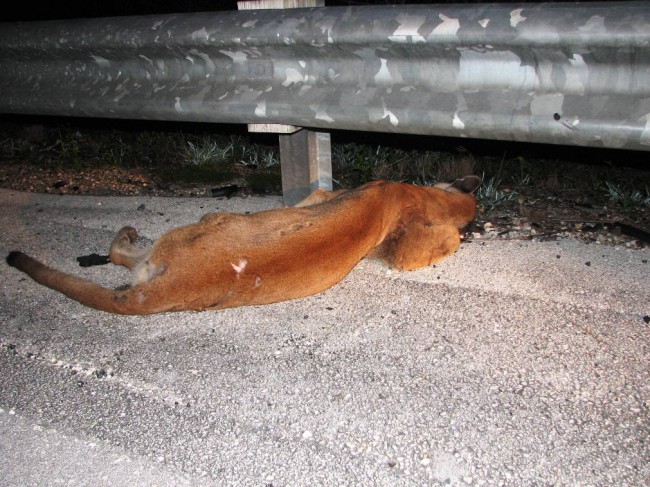
The Florida Fish and Wildlife Conservation Commission (FWC) documented 23 panther deaths in 2010. Of those, 16 panthers died after being struck by vehicles. Six of the panther deaths are attributed to “intraspecific aggression,” or panther-on-panther violence. One panther died of unknown causes.
This is very similar to 2009, when the FWC documented 25 deaths, with 17 of those killed by vehicles. The five-year average is approximately 23 panthers per year, with an average of almost 14 killed each year by vehicles. The Florida panther is an endangered species. All the panthers died or were killed in Collier, Hendry and Lee counties in 2010, where panther speed zones are in effect.
Click On:
- Florida Panther Research and Management, Annual Report (2009-2010)
- Florida Panther Website
- How A Panther Broadened City Beauty Board’s Mission to Include Riches & Perils of Public Art
- Palm Coast’s Panther Has Arrived at Linear Park
“Motorists should be aware that panthers are not always struck in posted panther speed zones,” said Darrell Land, FWC biologist and panther team leader. “We caution motorists to be on the lookout for the large cats in wild areas near panther zones, especially around sundown and sunrise.”
Panther speed zones are well-marked, with speed limits reduced at night to 45 mph. Motorists should be aware that violators often receive fines exceeding $200 for their first offense, and any violation of more than 29 mph over the posted limit will result in a mandatory court appearance.
“The FWC continues to work closely with the Florida Department of Transportation to develop measures that will increase motorist and panther safety along Florida’s roads,” Land said.
Land also said the panther population has been slowly increasing in Florida, which results in the documentation of more dead panthers. Land also noted the female panthers that were radio-tagged during 2010 produced 29 kittens. The total number of kittens born for the entire population is unknown.
Florida panthers have been listed federally as an endangered species since 1967 because of the small, isolated population and habitat loss. Recently the FWC completed a “Statement on Estimating Panther Population Size,” which notes there are likely between 100 and 160 adult panthers in South Florida.
“This number comes from combining several science-based methods to provide a lower and upper bound of the population,” said Kipp Frohlich, the FWC’s Imperiled Species Section leader. “This should be thought of as a theoretical range that provides some insight into the possible magnitude of the total population size. We are continually seeking improved methods for determining the most accurate estimates.”
Panther research and management funding comes directly from the additional fees collected when individuals purchase the “Protect the Florida panther” specialty license plate. Money also goes to law enforcement to increase patrols in the areas where panthers reside in South Florida.
Florida panther research, according to the wildlife commission, is funded through the Florida Panther Research and Management Trust Fund. This fund receives its monies from Floridians’ purchase of Florida panther specialty license plates. Eighty-five percent of the proceeds from the extra $25 collected annually go into this Trust Fund. However, to obtain the money, the FWC must submit a budget request each year to the Florida Legislature for approval. Caring for injured or orphaned panthers is not something that can be planned or budgeted for on an annual basis and that’s why this fund created, by WFF, is so beneficial. The money goes directly to help panthers and can be used when needed. The costs associated with panther care varies from as little as $400 per month to care for 3 young kittens recently orphaned after the death of their mother, to as much as $3,000 per month to repair the broken leg of and animal.
![]()
Panther specialty license plates are available at local tax collectors’ offices across the state. For more information, go to FloridaPantherNet.org and click on “Panther Pulse.” To report dead or injured panthers, call the FWC’s Wildlife Alert Hotline at 888/404-3922.





























Leave a Reply